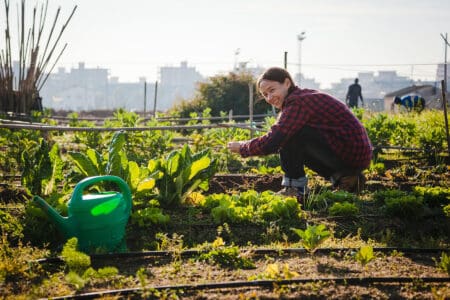Horticulture Training on the Rise with Career Changers
2021 seems to be the year of the career-changer, especially in horticulture. The Royal Horticultural Society (RHS) has reported a 58% increase in applicants for its work-based training programmes in 2021 – the highest in decades – as many reconsider their post-pandemic career options.
After a difficult and challenging year for all of us in lockdown, many have seen 2021 and post-lockdown life as the perfect opportunity to start anew in their careers and pursue their passions.
Horticulture offers many attractive positions for those seeking a mid-life career change, who can contribute to employers with sought-after transferable skills and maturity.
The horticulture industry alone is worth £24bn to the UK economy each year and provides a multitude of further economic, environmental, health, and social benefits. Demand for skills is constantly growing as the industry has an ageing workforce, relatively low numbers of apprentices across the sector and there is the pressing need for a highly skilled workforce in soil science, landscape design and biosecurity.
Horticulture is more than ‘gardening’
David Domoney, chartered horticulturist, writer and broadcaster, shared his experiences of working within the horticulture industry this summer. A regular on ITV’S This Morning and co-presenter of Alan Titchmarsh’s Love Your Garden, David explained why horticulture is so much more than simply gardening in his latest video on jobs and career paths in horticulture. Watch the full video here.
As David explains in his video, a job in horticulture does not automatically mean ‘gardener’, it is the incorrect term for a professional working within the industry. A gardener is a person who tends to their garden at home, or grows herbs from their kitchen, it is a hobby. Professional horticulture is so much more than this, it has so many facets; you can be a Managing Director of over 100 garden centres with 1000 staff, or a landscape architect designing acres of countryside. The possibilities are endless.
Environmental concerns
The importance of green spaces in combating many social ills is now widely recognised, from obesity to social regeneration. Investment is starting to follow.
Many environmental concerns are also being addressed through investment in green space. Trees, plants and lawns are now seen as having a key role in coping with our increasingly erratic rainfall. They stop our towns and cities overheating in summer too.
A more environmentally aware public are demanding food and, increasingly, plants, that have not been freighted huge distances. This and higher fuel costs mean the days of ever-rising imports are numbered.
As more people catch the “grow your own” bug, there are opportunities for retailers, nurseries and local authorities to help them produce fresh, healthy fruit and veg.
Fees and funding for adult learners
Have you put off higher education or further training due to the cost? If so, you are not alone. Many adults worry that going back to study will be unaffordable and out of their reach. However, once you know where to look, there is in fact a range of options out there for whatever qualification you are looking to gain.
To help you get started, we have compiled a handy guide with everything you need to know about adult funding support and the types of loans and grants available.
You don’t have to go into debt while pursuing long training courses. The Government is doing much to promote apprenticeships and other schemes to allow employees to learn on the job and study for a recognised qualification while still getting paid.
A significant number of apprentice applicants were career changers with 25-34 year olds accounting for 39% of applicants and 35-44 year olds for 17%. Around half (49%) were women.
What are the best courses to study for a career in horticulture?
Capel Manor College has been a centre for horticultural studies since 1968 and has developed an unrivalled reputation for excellence and strong industry links.
We offer a variety of full and part-time horticulture courses at all of our campuses across London. We also have a range of horticulture apprenticeships available.
By studying with us, you will be introduced to a unique array of plant species and collections, both within our campuses and across the capital, providing you with the opportunity to work within some of London’s most prestigious parks and gardens.
Discover your potential at London’s environmental college. Browse courses and apply online today.




